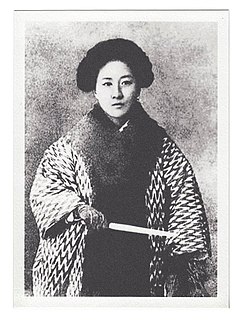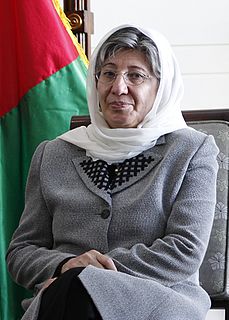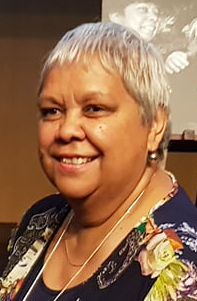A Quote by Michelle Bachelet
As a vibrant force in civil society, women continue to press for their rights, equal participation in decision-making, and the upholding of the principles of the revolution by the highest levels of leadership in Egypt.
Related Quotes
Women in the Arab world have a rich history in their active participation in political change from the Algeria revolution against the French occupation to the most recent revolution in Tunisia, Egypt, Libya among other countries. The question is not their participation. Their question is the incorporation of women's voices fully in the new definitions of the countries where change has happened.
Even into the 20th century, women were still struggling in the Western world for rights that Islam had granted women in the 7th century: equal rights to education; the right to own and inherit property; to have a voice in the decisions affecting their lives; to be active, engaged, and valued members of society at all levels.
[T]here are, at bottom, basically two ways to order social affairs, Coercively, through the mechanisms of the state - what we can call political society. And voluntarily, through the private interaction of individuals and associations - what we can call civil society. ... In a civil society, you make the decision. In a political society, someone else does. ... Civil society is based on reason, eloquence, and persuasion, which is to say voluntarism. Political society, on the other hand, is based on force.
I think in a society where you can't even pass the Equal Rights Amendment, it's very difficult to women make a progress. Incidentally, we are exactly 160 years after the very first women's public rights convention in Seneca Falls, New York, when a handful of women started it all and began the movement to make women equal.
The great paradox of the civil rights revolution is that instead of enforcing and expanding equality before the law, the revolution created differential rights based on race, gender and, any day now, sexual orientation. The great liberal revolution, centuries in the making, that brought forth equality in law has been overthrown. In its place we see rising a new feudal legal order of status-based rights.
For Indigenous Australians, equal rights and citizenship have not always translated into full participation in Australian society. All Indigenous Australians have only been counted in the census since the 1967 Referendum. Even so, State protection and welfare laws continued to control the lives of Indigenous Australians and denied them equal rights, well into the 1970's.
Production of identity is a resistance element, an aggressive element. Both a refusal and an affirmation and an assertion, and certainly, we in Jamaica were talking about black art. And the idea that there is a role for art in the civil rights revolution and in the successor to the civil rights revolution.


































